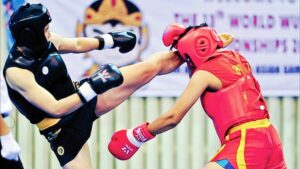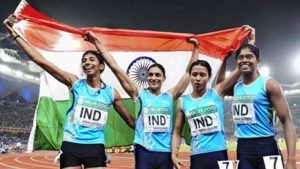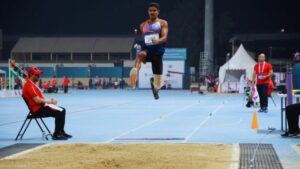Wushu is a Chinese martial art combining striking, grappling, and acrobatics elements. It is a popular sport in China and has grown in popularity in other parts of the world in recent years. Wushu was introduced in India for the first time in 1989. This sport is divided into two main styles – Sanshou and Taolou. India has achieved nine silver and eight bronze medals.
Also Read: History of Cricket in Asian Games
India’s Wushu Medals History
India has participated in the Wushu event at the Asian Games since 2006. The country has won 7 medals, including one silver and six bronze.
2006 Asian Games
- M. Bimoljit Singh (IND) 60kg
2010 Asian Games
- M. Bimoljit Singh (IND) 60kg
2014 Asian Games
- Narender Grewal (IND)60kg
- Yumnam Sanathoi Devi (IND) 52kg
2018 Asian Games
- Surya Bhanu Pratap Singh (IND) 60 kg
- Narender Grewal (IND) 65kg
- Naorem Roshibina Devi (IND) 60kg
- Wangkhem Sandhyarani Devi (IND) 60 – Silver Medal
- Santosh Kumar (IND) 56kg
India’s best performance in Wushu at the Asian Games was 2018 winning five medals. The country’s most successful wushu athlete is M. Bimoljit Singh, who won two bronze medals at the Asian Games.
India is still a relatively new player in Wushu, but the country has made significant progress in recent years. With continued investment and support, India has the potential to become a substantial influence in Wushu at the Asian Games and beyond.
The Future of Wushu in India
The future of Wushu in India looks bright. The sport is growing in popularity, and a strong pool of talent is emerging in the country. With continued investment and support, India can become a significant power internationally in Wushu.
One of the critical factors that will help India achieve its potential in Wushu is the development of a robust grassroots program. This will involve providing more opportunities for young people to learn Wushu, and it will also include creating a more supportive environment for Wushu athletes.
Another critical factor is the need for more qualified coaches and instructors. Wushu is a complex sport, and it requires specialized training to be successful.
With continued investment and support, India can become a significant force in Wushu internationally. The future of the sport in India looks bright, and it will be exciting to see how the country performs in the years to come.
Conclusion
India has made significant progress in Wushu in recent years. The country has won 9 medals at the Asian Games and has a strong talent pool emerging. India can become a significant player in Wushu at the international level.





